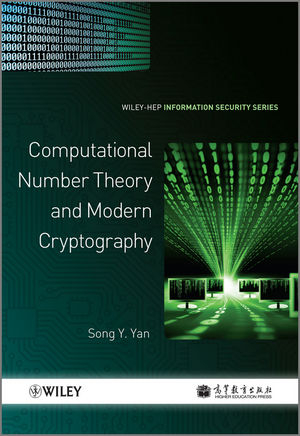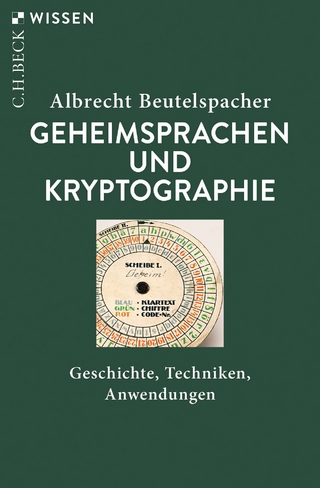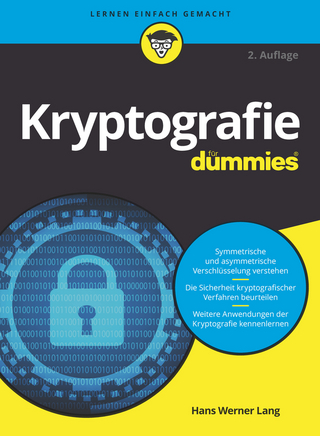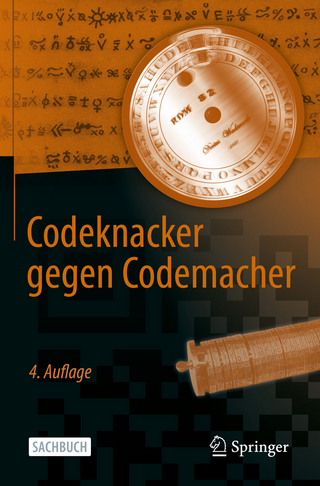
Computational Number Theory and Modern Cryptography
John Wiley & Sons Inc (Verlag)
978-1-118-18858-3 (ISBN)
- Lieferbar (Termin unbekannt)
- Versandkostenfrei innerhalb Deutschlands
- Auch auf Rechnung
- Verfügbarkeit in der Filiale vor Ort prüfen
- Artikel merken
The only book to provide a unified view of the interplay between computational number theory and cryptography Computational number theory and modern cryptography are two of the most important and fundamental research fields in information security. In this book, Song Y. Yang combines knowledge of these two critical fields, providing a unified view of the relationships between computational number theory and cryptography. The author takes an innovative approach, presenting mathematical ideas first, thereupon treating cryptography as an immediate application of the mathematical concepts. The book also presents topics from number theory, which are relevant for applications in public-key cryptography, as well as modern topics, such as coding and lattice based cryptography for post-quantum cryptography. The author further covers the current research and applications for common cryptographic algorithms, describing the mathematical problems behind these applications in a manner accessible to computer scientists and engineers.
Makes mathematical problems accessible to computer scientists and engineers by showing their immediate application
Presents topics from number theory relevant for public-key cryptography applications
Covers modern topics such as coding and lattice based cryptography for post-quantum cryptography
Starts with the basics, then goes into applications and areas of active research
Geared at a global audience; classroom tested in North America, Europe, and Asia
Incudes exercises in every chapter
Instructor resources available on the book’s Companion Website
Computational Number Theory and Modern Cryptography is ideal for graduate and advanced undergraduate students in computer science, communications engineering, cryptography and mathematics. Computer scientists, practicing cryptographers, and other professionals involved in various security schemes will also find this book to be a helpful reference.
Song Y. Yan, North China University of Technology, P.R. China and Harvard University, USA
About the Author ix
Preface xi
Acknowledgments xiii
Part I Preliminaries
1 Introduction 3
1.1 What is Number Theory? 3
1.2 What is Computation Theory? 9
1.3 What is Computational Number Theory? 15
1.4 What is Modern Cryptography? 29
1.5 Bibliographic Notes and Further Reading 32
References 32
2 Fundamentals 35
2.1 Basic Algebraic Structures 35
2.2 Divisibility Theory 46
2.3 Arithmetic Functions 75
2.4 Congruence Theory 89
2.5 Primitive Roots 131
2.6 Elliptic Curves 141
2.7 Bibliographic Notes and Further Reading 154
References 155
Part II Computational Number Theory
3 Primality Testing 159
3.1 Basic Tests 159
3.2 Miller–Rabin Test 168
3.3 Elliptic Curve Tests 173
3.4 AKS Test 178
3.5 Bibliographic Notes and Further Reading 187
References 188
4 Integer Factorization 191
4.1 Basic Concepts 191
4.2 Trial Divisions Factoring 194
4.3 ρ and p − 1 Methods 198
4.4 Elliptic Curve Method 205
4.5 Continued Fraction Method 209
4.6 Quadratic Sieve 214
4.7 Number Field Sieve 219
4.8 Bibliographic Notes and Further Reading 231
References 232
5 Discrete Logarithms 235
5.1 Basic Concepts 235
5.2 Baby-Step Giant-Step Method 237
5.3 Pohlig–Hellman Method 240
5.4 Index Calculus 246
5.5 Elliptic Curve Discrete Logarithms 251
5.6 Bibliographic Notes and Further Reading 260
References 261
Part III Modern Cryptography
6 Secret-Key Cryptography 265
6.1 Cryptography and Cryptanalysis 265
6.2 Classic Secret-Key Cryptography 277
6.3 Modern Secret-Key Cryptography 285
6.4 Bibliographic Notes and Further Reading 291
References 291
7 Integer Factorization Based Cryptography 293
7.1 RSA Cryptography 293
7.2 Cryptanalysis of RSA 302
7.3 Rabin Cryptography 319
7.4 Residuosity Based Cryptography 326
7.5 Zero-Knowledge Proof 331
7.6 Bibliographic Notes and Further Reading 335
References 335
8 Discrete Logarithm Based Cryptography 337
8.1 Diffie–Hellman–Merkle Key-Exchange Protocol 337
8.2 ElGamal Cryptography 342
8.3 Massey–Omura Cryptography 344
8.4 DLP-Based Digital Signatures 348
8.5 Bibliographic Notes and Further Reading 351
References 351
9 Elliptic Curve Discrete Logarithm Based Cryptography 353
9.1 Basic Ideas 353
9.2 Elliptic Curve Diffie–Hellman–Merkle Key Exchange Scheme 356
9.3 Elliptic Curve Massey–Omura Cryptography 360
9.4 Elliptic Curve ElGamal Cryptography 365
9.5 Elliptic Curve RSA Cryptosystem 370
9.6 Menezes–Vanstone Elliptic Curve Cryptography 371
9.7 Elliptic Curve DSA 373
9.8 Bibliographic Notes and Further Reading 374
References 375
Part IV Quantum Resistant Cryptography
10 Quantum Computational Number Theory 379
10.1 Quantum Algorithms for Order Finding 379
10.2 Quantum Algorithms for Integer Factorization 385
10.3 Quantum Algorithms for Discrete Logarithms 390
10.4 Quantum Algorithms for Elliptic Curve Discrete Logarithms 393
10.5 Bibliographic Notes and Further Reading 397
References 397
11 Quantum Resistant Cryptography 401
11.1 Coding-Based Cryptography 401
11.2 Lattice-Based Cryptography 403
11.3 Quantum Cryptography 404
11.4 DNA Biological Cryptography 406
11.5 Bibliographic Notes and Further Reading 409
References 410
Index 413
| Erscheint lt. Verlag | 6.2.2013 |
|---|---|
| Verlagsort | New York |
| Sprache | englisch |
| Maße | 174 x 252 mm |
| Gewicht | 785 g |
| Themenwelt | Mathematik / Informatik ► Informatik ► Netzwerke |
| Informatik ► Theorie / Studium ► Kryptologie | |
| Mathematik / Informatik ► Mathematik ► Arithmetik / Zahlentheorie | |
| Technik ► Elektrotechnik / Energietechnik | |
| ISBN-10 | 1-118-18858-6 / 1118188586 |
| ISBN-13 | 978-1-118-18858-3 / 9781118188583 |
| Zustand | Neuware |
| Haben Sie eine Frage zum Produkt? |
aus dem Bereich


